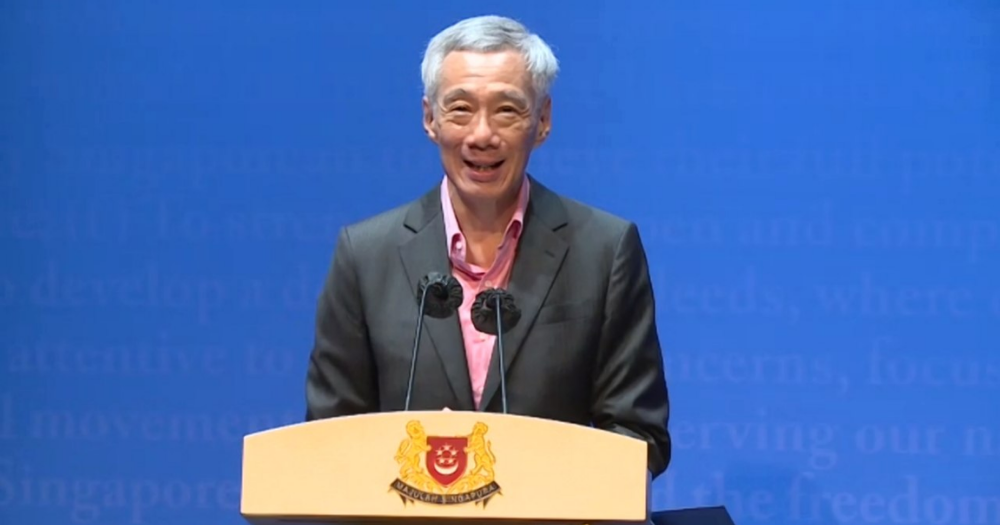Follow us on Telegram for the latest updates: https://t.me/mothershipsg
The People's Action Party (PAP) has been an important part of Singapore's stability and success and continues to carry a heavy responsibility for continuing it in the future, Prime Minister Lee Hsien Loong said in a speech at the National University of Singapore (NUS) University Cultural Centre on Tuesday (Dec. 14).
He was speaking as the Guest-of-Honour at the book launch of A History of the People's Action Party, 1985 - 2021, written by Shashi Jayakumar and published by NUS Press.
PAP's transition situation in 1985
The book chronicles the history of the PAP between 1985, when the party underwent the leadership transition from its founding generation to its successor team, up until the 2020 General Election, as well as the April 2021 changes in party leadership succession.
In his speech, PM Lee paralleled the PAP's current position of being in the midst of another leadership transition with the situation in 1985.
He explained that the 1984 General Election was not only a transition in leadership but also a generational change in the electorate.
The PAP's vote share fell by 12.9 per cent, and for the first time since independence, the PAP received less than 70 per cent of the total votes. Two opposition candidates — J. B. Jeyaretnam and Chiam See Tong — were elected.
Lee Kuan Yew attributed the results to the inevitable transition from the independence generation who had been with the PAP through the "baptism of fire during Merger and Malaysia", to a new generation of voters who were "better educated, more demanding of their leaders, and that had not experienced the struggles or known the hardships their parents’ generation went through".
"It seemed like the PAP was losing its political dominance," PM Lee said. "It was a moment for introspection, perhaps even concern. What did the future hold for the party, and for Singapore?"
Many people were anxious about the leadership succession, he added, and about more fractious politics and significant changes to leadership direction and government.
PAP has played important part in Singapore's stability and success
"The party leadership themselves were quietly resolved to build on our solid foundations, renew themselves, and take the country forward," PM Lee stated.
"But even they could not confidently predict that for another 35 years post-1985, the PAP would earn the strong support and trust from new generations of Singaporeans, keep itself vigorous and effective, dominate Singapore politics, provide Singapore with good and effective government, and take Singapore from Third World to the First, and beyond."
He added that for many Singaporeans who have lived through these decades, they "may not consider our stability, progress, and success astonishing".
However, it did not happen on its own, PM Lee said.
"This was hardly predicted, much less foreordained — far from it. It did not happen by itself, nor has it happened in very many other countries. And yet it happened in Singapore"
So how did Singapore manage to achieve this, PM Lee asked?
"The PAP is an important part of the explanation."
A History of the People's Action Party, 1985 - 2021 lays out how the party did so by engaging with and listening to the people, adapting policies to address Singaporean's needs and aspirations, delivering high standards of housing, healthcare, and education, and creating well-paying jobs and better futures for people, PM Lee said.
"And in doing so, [the PAP] earned the trust and mandate of the people, and kept the virtuous spiral going another turn."
Similarities between leadership transition today and 1985
PM Lee stated that today, like in 1985, the PAP is once again in the midst of a leadership transition, as it moves from 3G to 4G.
The voter base has changed greatly, with the pioneer generation of votes mostly gone and 60 per cent of today's voters born after independence.
"Growing up in a stable Singapore, they experienced steady progress year after year. They have benefitted from our collective efforts to develop our economy, and to build our Singaporean identity.
Their aspirations, hopes and expectations are different from those of the young voters of yesteryear, in the 1984 General Election, who are their parents."
The PAP "again won a strong mandate" from voters in the 2020 General Election, PM said. However, the vote share fell by 8.6 percentage points, and the PAP lost two GRCs to the Workers' Party for the first time.
He explained that similar to 1985, there are many questions about the future on people's minds, including:
- How will the PAP deal with new challenges?
- How will the 4G team respond? Do they have what it takes to overcome adversity and take Singapore forward?
- Will the new generation have the same survival instincts, to bond together with their leaders and gel together as one people?
PM Lee closed with a comparison between the current situation and the PAP's uncertain future in 1985:
"Just like in 1985, in 2021 no one can be sure what the future will bring. The next 35 years will be quite different from the last, and we cannot simply take what’s written in this book, and transpose it into the future.
Most fundamentally, our task is not to foretell the future, but to create it. The PAP continues to carry a heavy responsibility for Singapore’s security, stability, and success.
It must always work closely with Singaporeans to take the country forward, so that in 35 years' time another historian writing another volume about the PAP will have as inspiring a story to tell of how the party continued to keep Singapore exceptional and successful through the decades."
Follow and listen to our podcast here
Top photo via National University of Singapore.
If you like what you read, follow us on Facebook, Instagram, Twitter and Telegram to get the latest updates.
